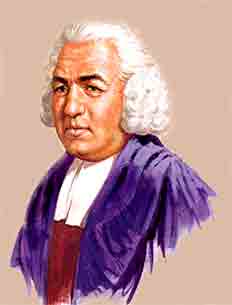

This song touched many people at various stages of their spiritual walks. The song "Amazing Grace," although originating in England, appeared in the colonies later accompanied with a different tune, more commonly known as “New British.” This song grew in popularity, but not because it was catchy tune, but because the words that Newton wrote related to every human being who encountered the saving grace of Jesus Christ. Newton did live long enough to see the signing of The Act for the Abolition of the Slave Trade. Although his thoughts were limited, Newton said he could remember two things, “That I am a great sinner, and that Christ is a great Savior.” With this conviction of newly found life that he found only in Christ, Newton passed from his earthly life in 1807, at the age of 82. In later years, Newton began to lose his memory. Newton's literary work against the slave trade encouraged abolitionist William Wilberforce to continue his legal fight against slavery in England.


God changed him from a man who was an advocate for the slave trade to a man actively working towards abolishing it. Newton was eventually ordained and began to lead his own church. He occasionally accepted requests to speak about his conversion in front of various congregations. Upon arriving safely home, Newton did not venture out to seek more slaves, instead he began to learn Hebrew and Greek. From then on, Newton dated March 21 as a day set aside for a time of humiliation, prayer, and praise. With both hands fastened onto the wheel of the boat, Newton cried out to God saying, “Lord, have mercy on us.” After eleven hours of steering, the remainder of the crew found safety with the calming of the storm. On one journey, Newton and his crew encountered a storm that swept some of his men overboard and left others with the likelihood of drowning. Following in his father’s footsteps, Newton began his life’s career by searching throughout the African coast for slaves to capture and eventually to sell for profit. Newton’s father remarried and the couple had another child. Newton grew up with both his mother and father, however, his mother died while his father was away at sea. Newton discusses where he was when he found God, or rather, when God found him. Although every person’s conversion story is unique, there is something about this hymn that remains relatable to Christians everywhere. By looking within the hymn “Amazing Grace,” one is able to understand a little bit about Newton’s personal conversion. In his song, “Amazing Grace,” Newton writes about a grace that is immense he writes about amazing grace, one that saved him out of his wretchedness. At the age of 47, John Newton, began the writing of a hymn that would grow increasingly more popular over the next 349 years. Let’s dive deeper into the story behind the song of “Amazing Grace.” The growing popularity of these hymns may make one wonder, how or why they gained so much traction in their journey throughout the world. Have you ever wondered who wrote some of the most popular hymns? Have you wondered for what purpose they were written? There are hundreds of hymns in the world, some incredibly well-known across numerous countries. While this prayer by King David teaches us a lesson of thanksgiving and humility, it is a passage that was used in a popular hymn written by John Newton. Uncategorized Hymnology: The Story Behind “Amazing Grace”ġ Chronicles 17:16, “Who am I, O LORD God, and what is my house, that you have brought me thus far?”


 0 kommentar(er)
0 kommentar(er)
